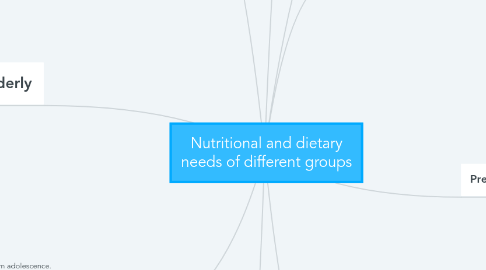Nutritional and dietary needs of different groups
by Georgia Lees

1. Babies (0-12 months)
1.1. Breast milk and infant formula milk contains all the required nutrients
1.2. In their early months they rely on iron stores so their diet must meet the baby's needs for growth and development by including iron-rich foods
1.3. Eggs must be cooked until solid and should not be given to babies under 6 months
1.4. Sugar and salt must not be added
1.5. Cow's milk should be avoided due to the risk of gastrointestinal bleeding
1.6. Protein, B vitamins, magnesium, zinc, sodium and chloride intake increase between 6 and 12 months
2. Pre-school age children (12 months-4 years)
2.1. Increased need for protein and all vitamins except from vitamin D as they will get this from sunlight
2.2. Energy requirements increase as the children are active and growing rapidly
2.3. Should be given whole milk
2.4. Sensible patterns of eating should be established
2.4.1. Snacks should be nutritious foods such as yogurt and carrots to help establish this
2.5. New node
2.6. The amount of fibre needs to be controlled as over-consumption can result in them not being able to eat enough food to satisfy their energy needs
3. School age children (4-10 years)
3.1. Increased requirements for energy and protein
3.2. Asian children may be at risk of vitamin D deficiency because of low vitamin intake from food or inadequate exposure of skin to sunshine
3.3. No change in the requirements for thiamin, vitamin C or vitamin A
4. Adolescents
4.1. For both boys and girls energy and protein requirements increase
4.2. There is an increased requirement for all vitamins and minerals in boys and girls have an increased requirement for all the minerals. However girls do not require a change in the amount of thiamin, niacin and vitamin B6 needed.
4.3. Girls have a higher iron requirement once menstruation starts and also need less zinc and calcium
4.4. New node
5. Adults
5.1. Energy requirements, amount of calcium needed and amount of phosphorus needed in both men and women decrease from adolescence.
5.2. There is a reduced need for magnesium in women and iron in men
5.3. Energy required should equal the amount used for body maintenance and in exercise
5.4. Meals should be based around starchy foods and the eatwell guide should be used as base for all meals
6. Elderly
6.1. Because of the reduction in physical activity energy requirements may decrease gradually from 50 in women and 60 in men
6.2. Protein requirements decrease for men but continue to increase slightly in women
6.3. New node
6.4. Elderly people are more likely to be deficient in vitamin C, D and folate
6.5. Anaemia can occur due to poor absorption and blood loss as a result of injury so foods rich in iron should be included in the diet.
6.6. Zinc is needed for a healthy immune system and to help with wound healing of pressure sores and leg ulcers, a lack of zinc may be a factor in causing dementia
6.7. Adequate intakes of calcium should be included for good bone health
6.8. The consumption of cereals and drinking a variety of drinks will reduce the risk of constipation, bowel problems and dehydration
7. Vegetarians
7.1. Must consume an adequate intake of essential nutrients and the amino acids in one plant protein can be compensated for by the amino acids in another
7.2. New node
7.3. Vegans may need to take a vitamin B12 supplement as it is found in foods of animal origin
8. Pregnant women
8.1. Most of the extra nutrients needed during pregnancy are provided by a healthy balanced diet
8.2. Fish is a good source of essential fatty acids although they are advised to not consume more than two portions of oily fish per week
8.3. Meat must be cooked thoroughly and all fruit and vegetables should be washed before eating to avoid toxoplasmosis
8.4. Shark, swordfish and marlin should be avoided and tuna limited to two steaks per week as the levels of mercury found in these foods can harm the baby's developing nervous system
8.5. They are advised not to take supplements of vitamin A or liver due to risk of birth defects
8.6. Soft cheeses such as Stilton and pâté should be avoided because of the possible risk of listeria which can lead to premature birth or miscarriages
8.7. New node
9. Lactating women
9.1. An extra 300-400kcal is required for fully breastfeeding mothers during the first three months
9.2. It is recommended that eight to twelve glasses of water a day are drunk, as this helps the body produce the milk needed to feed the baby
9.3. Caffeine and alcohol can pass from the blood into breast milk, so intake of these should be limited
9.4. It is advisable to lose weight gradually as rapid weight loss may be harmful to the baby because the breast milk may not contain sufficient nutrients



